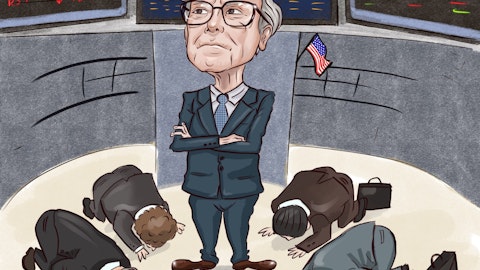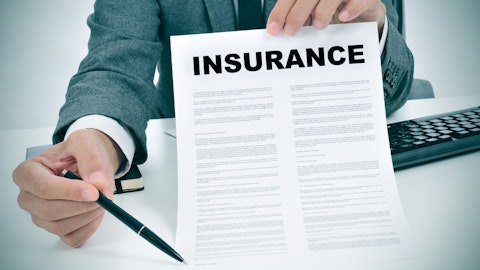Scott Heleniak: Just one last one, too, just on the expense ratio. You made significant improvement in 2022. And should you think we should expect any further improvement on that, or is it — do you think it’s sort of leveled out there? I know a lot of that is driven by premium leverage.
Brian Costanzo: Yes, you nailed it right there at the end, Scott. You’ll have to see and observe it as we go through the year, it will depend on sort of the trend, I think, with regards to net earned premium, which will follow the trend with regards to how we see gross written premium play out. And a lot of that story for 2023 is going to be looking at kind of the pricing environment and the trend that we were talking about before. So, we are really pleased with the progress that we’ve been making in the expense ratio, focused on productivity and the ability to scale off our expense base as we’ve grown. I think we can continue to do that. I don’t know it will be at the rate that we’ve seen in the last couple of years.
Operator: And we’ll take a follow-up from Mark Hughes at Truist.
Mark Hughes: Yes. Thank you. I wonder, any thoughts on the 2020 and 2021 accident years, how those — have those been subject to the same forces? I know the initial frequency and severity was low as a result of COVID, or I assume you would see it that way? I’m just sort of curious whether they are also developing adversely maybe from a much better position to start with.
Brian Costanzo: A couple of things I’d point to, Mark. So, when you start talking about in the longer tail lines, accident years like 2020 and 2021, and then clearly, the current one with regards to €˜22, right? It takes a while to see an emergence of claims activity. So, we’re not kind of at that sort of seasoning yet. So, we’re not seeing unexpected claims activity. Additionally, as I mentioned before, the improvement in the broader sort of specialty insurance marketplace, with regards to pricing, terms and conditions, underwriting actions, right, that’s a contrast with the hardening and the improvement in the insurance market that started to take place in 2019 and carried through 2022. So, that creates, I think, a different dynamic on the more recent years in the past year.
What I would suggest, and even sort of what we talked about this year with regards to the current accident year loss ratio, we’re taking a very cautious view, right, given the sort of the economic backdrop. We’re not seeing anything that’s unexpected or unpleasant on the most recent years.
Mark Hughes: Understood. And then what was the impact of your Hagerty investment on the P&L in the quarter?
Tom Gayner: Not very much.
Mark Hughes: Okay. Your total equities at the end of the quarter was at $4.6 billion?
Tom Gayner: No, that’s cumulative unrealized gain. Yes. That’s what we bought — $4.6 billion more than we paid for it.
Mark Hughes: Yes, yes. What was the total balance on your equities at the end of the quarter?
Tom Gayner: Looks like 7.6 publicly traded equities.
Operator: And this concludes our question-and-answer session. I would like to turn the conference back over to Tom Gayner for any closing remarks.
Tom Gayner: Thank you very much for joining us. We look forward to hearing from you on the next call and seeing you in Richmond at our annual meeting on May 17th. Thank you so much. Bye, bye.
Operator: The conference call has now concluded. Thank you for attending today’s presentation. You may now disconnect.
Follow Markel Group Inc. (NYSE:MKL)
Follow Markel Group Inc. (NYSE:MKL)
Receive real-time insider trading and news alerts




